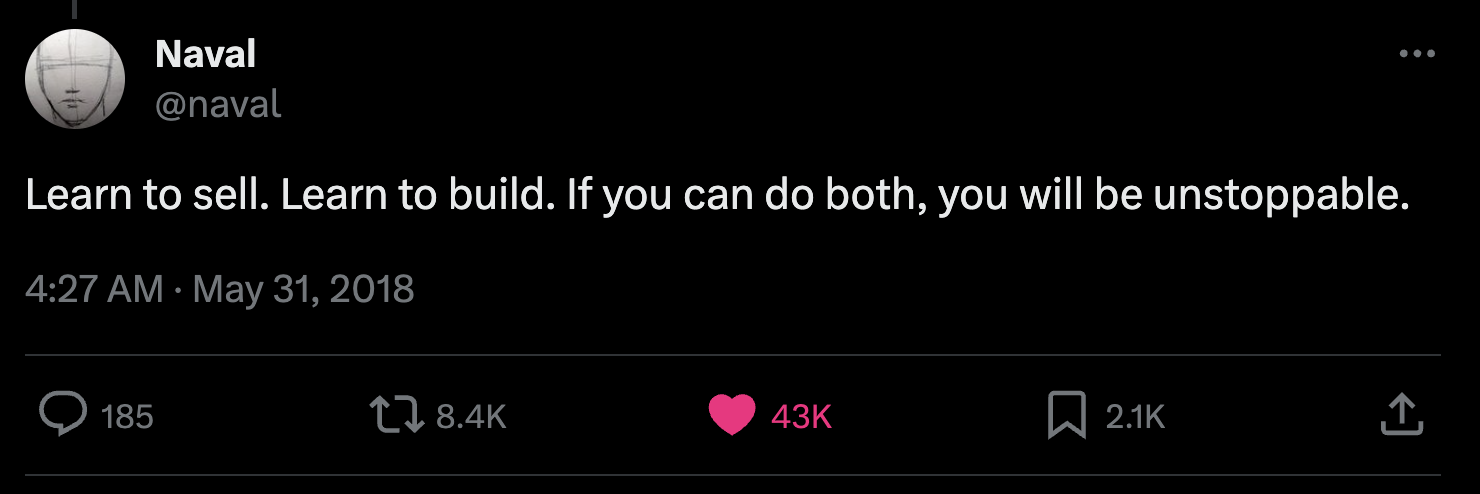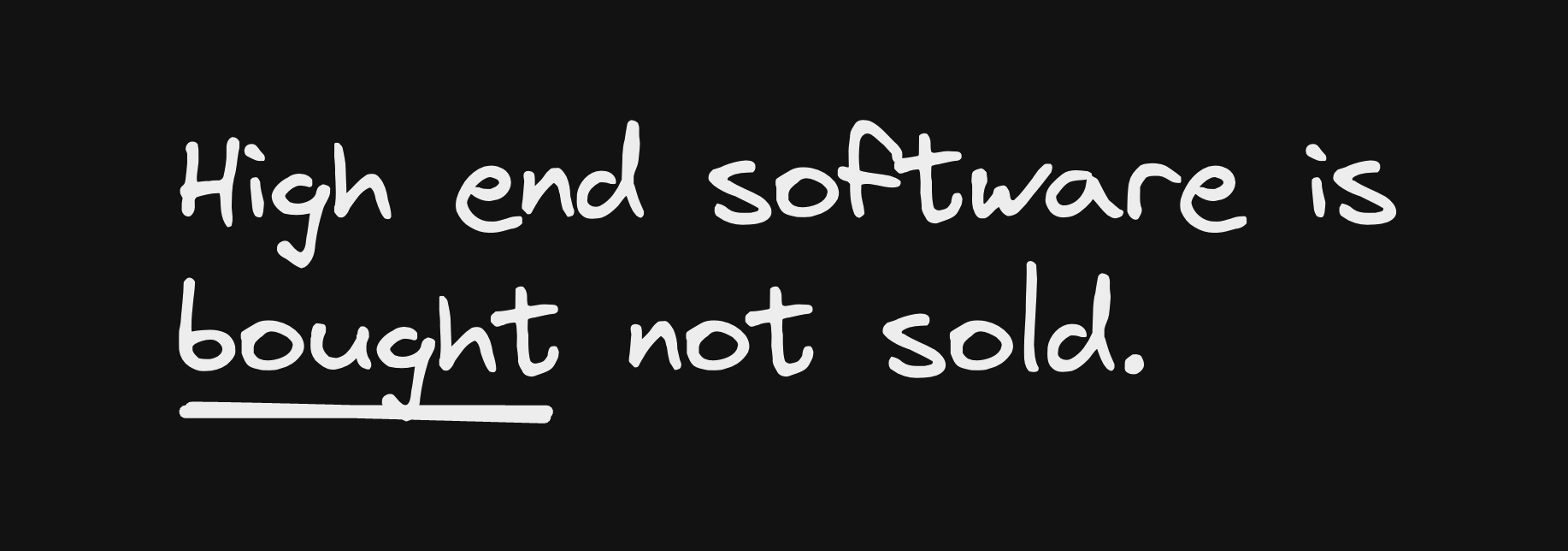
Get Rich by Becoming a Sales Engineer
1/2024 Aman Azad

Video Overview
Table of Contents
- Sales Engineering 101
- The Market for SEs (Comp, Number of Roles)
- A Typical Sales Engineer Interview
- Learning to Sell - The BEST Way to Prepare for SE Interviews
- My Personal Journey Into this Role
- What's Next
Let’s assume a few things about you. You are a software engineer, you’re great at building product, but you want more freedom than what you can get out of a some tiered software engineering job at a FAANG. If your goal is to build freedom through wealth, you HAVE to consider the sales engineering role.
“Learn to sell. Learn to build. If you can do both, you will be unstoppable.” - Naval.

You’ve already mastered coding - it’s time to build up the sales skills you need that’ll unlock a whole new world of personal wealth creation. Sales engineering forces you to get tons of reps in doing the things that’ll make you a better communicator: discovery calls, technical demos, webinars, maybe even some lead gen depending on the specifics of the role. You’ll do all this while still earning a significant amount of money, with comp comparable to most senior-level software engineers.
You’ll use your technical skills, and your ability to communicate value to launch solo products like Marc Lou, Peter Lievels, or Danny Postma. You’ll use it to build pitch decks and raise VC investment like I did with Legaci. You’ll launch a dev agency and build a money printer selling your services to clients. You’ll be unstoppable.

Let’s get into what the sales engineering role exactly looks like, what the general market is like, how to prep and interview for SE positions, and my personal journey of being a lifelong programmer turned SE.
Sales Engineering 101

Sales engineering exists to assist non-technical account executives (aka sales reps) with the thorny technical bits when selling into organizations. Usually, the product is deeply technical in nature. The buyer typically will be some executive or leader at a company who may want the solution being sold to be vetted by their technical team.
Your job as a sales engineer is to interface with the executive and technical team and make sure you represent the technical side of the buying equation.
This typically manifests in a few ways mentioned above. Discovery calls and technical demos are the bulk of this work. You hop into conversations with clients, make sure both parties know what they’re getting into, whether the product your company is selling actually can solve a problem the client has, and so on.
The technical demo is an extension of the discovery process where you’ll showcase whatever features the client needs to see their problems solved.
Sometimes you may not have a full calendar of customer calls, so your company might have you running webinars to generate more demand, write articles, or in other ways use your technical skills to generate more interest and inbound for your product.
The Market for Sales Engineers
Compensation data from levels.fyi:
 Sales Engineering Comp
Sales Engineering Comp
 Software Engineering Comp
Software Engineering Comp
On Compensation vs Software Engineering
The market for sales engineers is strong. Your 80th percentile sales engineer comp is slightly higher than the comparable software engineer, however the top end is a bit less.
This can be explained by the sales engineer role typically being filled by folks senior in some technical role. A junior dev might have a hard time building trust with clients if they’re trying to speak on highly technical topics with a Director of Engineering.
On the high end of comp, sales engineering really isn’t a role that can be tiered as with software engineers. Either you stay as a SE, or you move into leadership.
This has to do with how sales engineers can leverage their skill set. With software the leverage for an individual contributor in writing code 10x better than their peers can exist. The same is not true in the world of sales. The only way for a highly skilled sales engineer to add leverage is to lead, and coach more individuals - aka management.
On the Number of Overall Positions
The number of positions available for sales engineering is also much lower. This also makes sense considering Sales Engineering cannot exist as a job Day 1 for a new company with a typical Silicon Valley CEO+CTO founding team.
In this typical company, the CTO essentially act as the company’s first SE and can hold that role for a long time until growth becomes too much to handle.
A Typical Sales Engineer Interview

This’ll be great news for life-long software engineers - throw the leetcode problems away. These are not seen in the world of sales engineer interviewing, it has no bearing on how well you can communicate with clients, and communicate value.
Your sales engineering interview will be highly behavioral based - how and why questions related to dealing with customers, management, and how you work.
There should be some role-play scenario where you essentially have to hop on a discovery or demo call showcasing the company’s products.
There might be some technical component as well, depending on the particular company. For example, interviewing for a developer tooling company, there might be some technical take-home assignment using the product.
Learning to Sell - The BEST Way to Prepare for SE Interviews

The biggest issue with preparing for SE interviews a dev might feel is not knowing what exactly “selling” is, or looks like.
It is not what you saw at the used Kia dealership.
High end software and services are bought not sold.
Your goal is to build trust, show you can solve your clients problems, and get on the same side of the table working with each other, not against.
The best way to learn this is Just Learn To Sell. You’re a developer - sell a website to a friend, sell a weekly retainer for some contract work, build a mobile app and try to sell it with some marketing material. Learn how it feels to fail, how it feels to get on the same side of the table, how it feels to solve someone’s big problem for lots of money, and how it feels to win.
In doing this, you’ll start to build a war chest of anecdotes and stories you’ll use in your interview. You’ll hopefully have a revenue number you can point to and say “I sold $XX,XXX in services with my own two hands”. You’ll have so much more confidence in your ability to communicate.
My Personal Journey Into this Role

The outline I gave above was my journey into this position.
Here’s quick overview of my career so far. Every step of the way I accrued personal skills, either technical or sales-oriented, that led me to my current SE position.
I started writing code when I was 12 (how to be a hacker).
I finished a CS degree at UCSD. In my time at UCSD I felt I was more extroverted than the typical CS student, joined a fraternity (Phi Delta Theta), and built some failed attempts at startups with some friends I made there.
3 years into graduating and working as a professional software engineer, I cofounded Legaci and we raised $1mill in VC funding. I was the company’s CTO. We sold Patreon style membership programs to musicians and YouTubers. As CTO I ran technical demos, did discovery calls, and ideated solutions with our customers (TigerBelly, BI, Strictly Dumpling).
While at Legaci, I started Canoga Digital, a software development agency. I ran SEO and a TikTok/Instagram reel campaign for an app I built (ArabicBridge), and I sold north of $10k in services in the first few weeks of “launching” (essentially, texting my network that I’m open for side work).
And up to the date I’m writing this, I’m a Sales Engineer at Vercel.
Like I’ve mentioned above, throughout my career I’ve built up tons of stories and anecdotes of how I overcame objections, how I handled certain interpersonal issues, and how I sold. These were invaluable in my interview with Vercel.
What's Next
I mentioned the outcomes briefly at the start of this. If you can build, and you can sell, the world is at your fingertips. Your skill set is now so unique you can express far more agency in your career and how you want your life to look than if you were silo’d into one bucket or the other.
